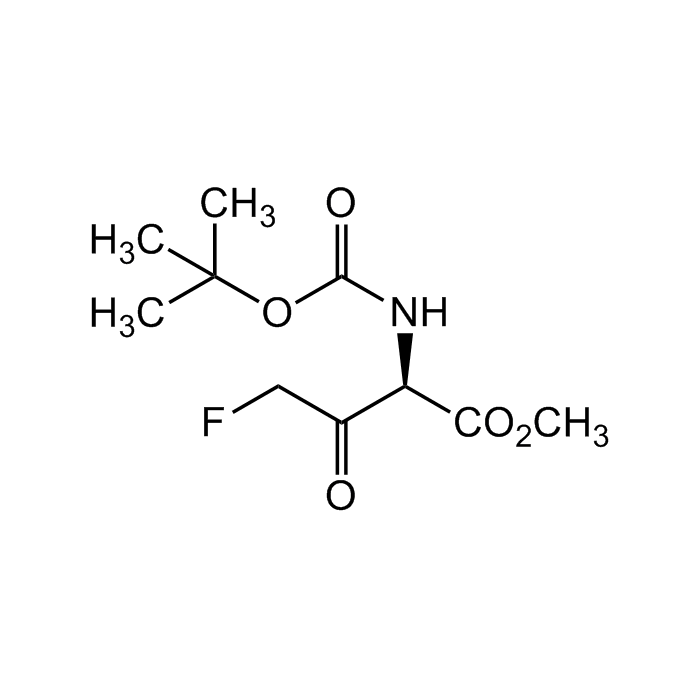Cookie Policy: This site uses cookies to improve your experience. You can find out more about our use of cookies in our Privacy Policy. By continuing to browse this site you agree to our use of cookies.
AdipoGen Life Sciences
Boc-Asp(OMe)-FMK
As low as
110
CHF
CHF 110.00
In stock
Only %1 left
AG-CP3-0030-M0011 mgCHF 110.00
AG-CP3-0030-M0055 mgCHF 440.00

| Product Details | |
|---|---|
| Synonyms | Boc-D(OMe)-FMK; Boc-D-FMK; BAF |
| Product Type | Chemical |
| Properties | |
| Formula |
C11H18FNO5 |
| MW | 263.3 |
| Sequence |
Boc-Asp(OMe)-fluoromethylketone |
| CAS | 187389-53-3 |
| Purity Chemicals | ≥98% |
| Appearance | White to off-white powder. |
| Solubility | Soluble in ethanol (5mg/ml), DMSO or DMF (both 30mg/ml). |
| Other Product Data |
Prepare a 20mM stock solution of the caspase inhibitor in DMSO. Add 1µl of above stock solutions to 1ml of culture medium containing cells to give 20µM final concentration. We recommend to ensure the residual amount of DMSO is insignificant (<0.1%), since it may have physiological effects at low concentrations and thus masking the effect of the ICE-protease inhibitor Boc-D(OMe)-FMK. For in vivo experiments extending for 12 to 48 hours, fresh inhibitor may have to be added (injected) due to inactivation by reaction with cysteine protease. |
| InChi Key | IPYYWMLWOBWDDP-UHFFFAOYSA-N |
| Smiles | FCC([C@@H](NC(OC(C)(C)C)=O)C(OC)=O)=O |
| Shipping and Handling | |
| Shipping | AMBIENT |
| Short Term Storage | +4°C |
| Long Term Storage | -20°C |
| Handling Advice | Keep cool and dry. |
| Use/Stability | Stable for at least 3 years after receipt when stored at -20°C. |
| Documents | |
| MSDS |
 Download PDF Download PDF |
| Product Specification Sheet | |
| Datasheet |
 Download PDF Download PDF |
Description
- Cell permeable, irreversible, broad-spectrum caspase inhibitor. Inhibits non-caspase cysteine proteases, as well as cathepsins H and L. Can be used for in vitro and in vivo studies.
- Contains a methyl ester group, which facilitates uptake by cells and subsequently is removed by cytoplasmic esterases, leaving the functional inhibitor.
- Inhibits the pro-apoptotic effect of TNF-α (IC50=39µM). Shown to reduce the activation of NF-kB, suppresses the phosphorylation of IkBα and inhibits TNF-induced expression of ICAM-1 and VCAM-1.
- Blocks hepatocyte apoptosis in vivo.
- Neuroprotective.
Product References
- Different interleukin-1 beta converting enzyme (ICE) family protease requirements for the apoptotic death of T lymphocytes triggered by diverse stimuli: A. Sarin, et al.; J. Exp. Med. 184, 2445 (1996)
- A DEVD-inhibited caspase other than CPP32 is involved in the commitment of cerebellar granule neurons to apoptosis induced by K+ deprivation: S.R. D'Mello, et al.; J. Neurochem. 70, 1809 (1998)
- Caspase inhibitor BD-fmk distinguishes transforming growth factor β-induced apoptosis from growth inhibition: T.L. Brown, et al.; Cell Growth Differ. 9, 869 (1998)
- Function of caspases in regulating apoptosis caused by erythropoietin deprivation in erythroid progenitors: P.A. Gregoli & M.C. Bondurant; J.Cell Physiol. 178, 133 (1999)
- Caspase inhibitors promote the survival of avulsed spinal motoneurons in neonatal rats: Y.M. Chan, et al.; Neurorep. 12, 541 (2001)
- z-VAD-fmk augmentation of TNFα-stimulated neutrophil apoptosis is compound specific and does not involve the generation of reactive oxygen species: A.S. Cowburn, et al.; Blood 105, 2970 (2005)
- Broad-spectrum caspase inhibitors: From myth to reality? D. Chauvier, et al.; Cell Death Diff. 14, 387 (2007)
- boc-Aspartyl(OMe)-fluoromethylketone attenuates mitochondrial release of cytochrome c and delays brain tissue loss after traumatic brain injury in rats: R.S. Clark, et al.; J. Cereb. Blood Flow Metab. 27, 316 (2007)
- Effect of Boc-D-Fmk on hepatocyte apoptosis after bile duct ligation in rat and survival rate after endotoxin challenge: S.M. Sheen-Chen, et al.; J. Gastroenterol. Hepatol. 23, 1276 (2008)
- TNF induces caspase-dependent inflammation in renal endothelial cells through a Rho- and myosin light chain kinase-dependent mechanism: X. Wu, et al.; Am. J. Physiol. Renal. Physiol. 297, F316 (2009)
- Pharmacological caspase inhibitors: research towards therapeutic perspectives: J. Kudelova, et al.; J. Physiol. Pharmacol. 66, 473 (2015) (Review)





